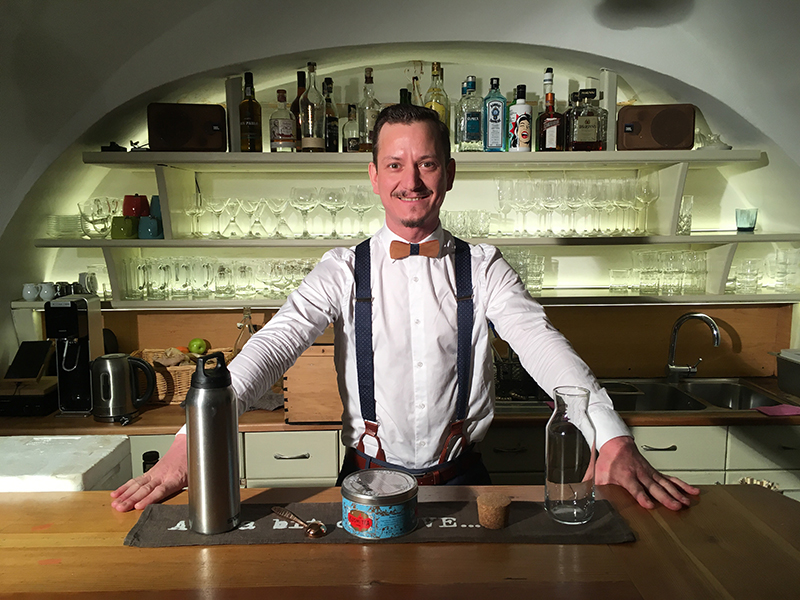He positively radiates positive energy and existential joy in what he does. Whenever you see Jiří Boháč in action, making tea, mixing tea drinks or even compering the competition Metelka Cup, after a while you simply have to start smiling like him. His vitality is highly contagious. But don’t go thinking that he is a cheap magician pulling figurative rabbits out of hats. The thirty-nine-year-old trailblazer of the new gastronomic field of teatender is a true professional and an expert, as shown by the many awards he has won. His personality was summed up perhaps most aptly on the Czech Television programme Gejzír by Miroslav Černík, a member of the Association of Czech Bartenders Emeritus: “This man was born with a cup of tea in his hand, and tea flows through his veins instead of blood. His whole being revolves around tea.”
How did a boy from Ostrava, which is an “earthy” region, set out on the delicate and spiritual “way of the tea”?
The very fact that I am from Ostrava has guided me in depth, more under the surface. But another reason is definitely my romantic soul, and I love everything exotic and foreign. The tearoom offered this world to me. There weren’t many alternatives to the conventional pub. Many lucky circumstances turned my love for tea into a profession.
Ever since you were a student you have lived in Prague, but would you say that as a child Ostrava furnished you with some qualities that Prague’s inhabitants lack and have helped you succeed?
You can’t really generalise and simplify it like that – it’s down to the individual. And in any case, I didn’t spend much time in Ostrava. I spent a lot of time in the countryside, first of all with my parents and then as a member of the Lynx scout troop. From the age of eleven I was a member of the camping group BVÚ (Czech abbreviation for Fighting Spirit, Endurance, Effort – editor’s note), which was founded after the Second World War. It was a boys-only group, and it retained the spirit of post-war discipline combined with the ideals of the adventure story writer Jaroslav Foglar. It was a hard experience in my childhood to cut myself free from my mother’s apron strings and show the male world what I was worth. And I think this was when I gained my first moral values, spiritual resilience and ambition. Sayings like “cowards die a thousand times, the brave only once” or “you can never take back an uttered word or a shot arrow” made me who I am.
After almost twenty years in this constantly dynamically developing field of gastronomy, what do you consider your greatest success? Is it the fact that you came up with the word used to describe this profession and which has also caught on abroad? Or is it the creation of a Czech Teatenders’ Section of the Czech Bartenders’ Association? Or is it the fact that you are the runner-up in the world championship in the mixing of non-alcoholic cocktails?
For me it’s definitely the fact that I’m doing something I enjoy. I was told countless times to get a normal job and heard questions like when are you going to grow up or when are you going to stand on your own two feet… My success is that I am who I am, and I do what I do.
You won the republic-wide bartenders competition in mixing non-alcoholic cocktails Mattoni Grand Drink with the cocktail IQ Mattoni, and later it made you the world runner-up and you also won an award for the best technique and design. How did you come up with the competition recipe for this drink? What gave you the idea to combine Oregon Klamath algae tincture, White Anastasia tea, thyme syrup, fresh lime and mineral water? How much time do you spend on the preparation and testing of a recipe before you present it to the public?
The preparation of the recipe was a wonderful process. First of all, I was intrigued by a friend drinking a wonderfully turquoise drink made of Klamath algae out of a clear bottle. She was standing at the window, and the light entering the room made the drink even sparklier. It fascinated me, and I knew right away that I would use Klamath. A week before I handed ii the competition recipe, a friend asked me to help get a stand settled in at the EVOLUTION trade fair, where he was planning to present a water from a unique Hungarian source. I suggested that I would prepare one drink using their water and share with people my process for finding the ideal balance of flavours, and this would liven up the stand and perhaps generate interest. This really did occur, and for the entire three days I got the visitors involved in the actual search for a drink. And two days before the trade fair I had a vision where I served the cocktail in a bottle with a special IQ Mattoni label. I made about forty versions before I came up with the right balance. I utilised the trade fair environment and sought out interesting products, mainly syrups, from the stallholders. By complete coincidence, at the last stand and just before the end of the trade fair, the company Camellus and its thyme caught my attention. I have loved thyme ever since I was a child. And my choice of tea from Kusmi Tea was pragmatic. White Anastasia had just been launched on the market, and I wanted to popularise it properly as a brand ambassador.
Which tea can you say was “the best I have ever drunk” and why? Is there a clear direct correlation for teas where the more expensive the better?
For me tea drinking is deeply linked with the environment and the time. I really appreciate it when the enjoyment of tea is combined with contact with people, the environment or with myself. This is a not a taste criterion. On the pragmatic level it is definitely true that you have to pay more for a more exquisite tea.
You are a man of many interests and professions – teatender, compere, a coach for beginning teatenders, and you have recently acted in a play about Rudolf Jedlička, the founder of the Jedlička Institute. All of these roles have one thing in common – public performance. Does a teatender need to have a gift for acting?
He doesn’t need to. I don’t want all teatenders to be the same. And that’s not possible in any case. But one thing that we should all have in common is a love for people.
Do you rehearse your performances? How much time does that practice take?
As Majk Spirit sings: “What you give to the roots of a tree, you get back in the crown.” Every day I find there is a direct correlation.
What should every teatender learn a little of, apart from a thorough knowledge of tea and tea culture? Which “ingredients” make his a good teatender?
It’s a profession like any other. You can’t buy experience or find it in books. Emotional intelligence and soft skills are essential in gastronomy today. You need to try out things all the time and not be afraid to make mistakes. Work with tea is magical, and everyone can find a niche that suits them.
You’ve been helping young teatenders for a long time, on various courses and in connection with the activities of the Czech Teatenders section. Can you hazard a guess at the future of teatenders in the Czech Republic? Do you have any particular dream for it?
I can’t tell the future, but I won’t deny that I enjoy looking into it. I see a growing wave of popularity for tea within society. For years I have felt like a surfer learning on the small waves, but every day I become surer on my board. I am attracting the attention of my surroundings, but every now and again I have to do a flip so that they get their boards ready too, because we are in for one hell of a ride! Personally I would like for teatender to become a generally acknowledged profession which offers a satisfactory living to young professionals.
You help young teatenders and trainee bartenders by easing their competition nerves when you compere the Metelka Cup in Slavkov near Brno. How is the Metelka Cup doing in comparison with other comparable competitions in the series? In your opinion, what makes the Metelka Cup attractive for the general public?
I don’t want to offend anyone, but it is not usual for the sponsor of a competition to focus so much attention on the actual event. Mr Metelka is not only present in person, but he also works through the recipes, the photographs taken and other output, which is a great motivation for the competitors, i.e., the students. The competition is a fun exposition of a beautiful professional and is also an essential experience for the development of all participants. For me it is a competition that I look forward to every year. I’ll be there for the fourth time this year.
Do the world of tea and world of liqueurs have something in common? Apart from the fact that both types of drink can have an intoxicating effect…
I have always liked liqueurs. I can see in them a historical subtext, the work of the old alchemists with a desire to preserve the power of all kinds of herbs. Enjoyment or intoxication go hand in hand with the ability to capture the effect of nature, the world of fragrances and flavours.
Could any of Metelka’s liqueurs be suitable for the preparation of tea cocktails? If so, which ones specifically and why?
For example the very successful egg liqueur or my favourite Saint Hubert’s. I love preparing non-alcoholic or low-alcoholic drinks, which liqueurs are suitable for.
If you have tried any Metelka liqueurs for the preparation of a tea cocktail, could you divulge the recipe for its preparation?
I don’t remember the proportions now, but I found that Saint Hubert’s was a good combination with a mixture of Euphoria from the company Kusmi Tea based on roast Paraguayan sesame with chocolate. I completed the drink with a ribwort-mint syrup and a drop of lemon juice. I mixed the cocktail in a mixing glass and served it in a classic martini glass with a dash of orange peel.
Apart from the liqueur Tea Spirit, have you tried any other Metelka liqueurs? Have you got any personal favourites, and why?
I’ve tried plenty of them to find out what Mr Metelka can do. I like to drink egg liqueur with my friend at the tearoom Čajovna U Legionář, and it takes me back to my childhood. I used to sip it secretly from the larder at my grandmother’s. I’ll never forget that taste.
When we look at the breadth of your activities, we have to ask: Do you have any free time at all? How do you spend it?
At one time the boundary between free time and work was very blurry. I like to relax. I like walking in the country with my son, playing the guitar and dancing. When I’m not so tired that I just have to crash out, my relaxation is active. Cooking really helps me clear my head.



